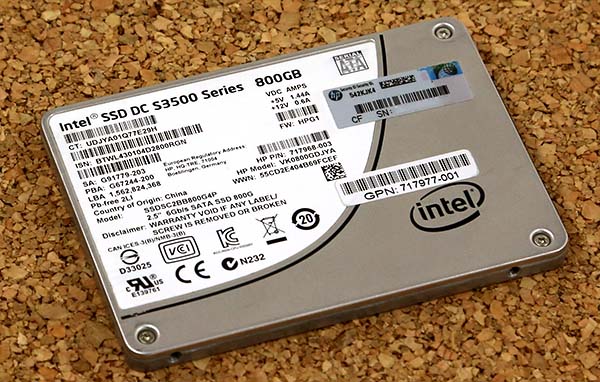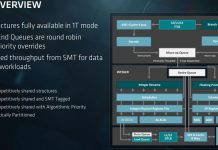Recently we had the opportunity to purchase a few Intel S3500 800GB drives for testing at an excellent price. The Intel S3500 is well known for its relatively solid performance and competitive pricing. It has Intel’s power loss protection onboard and has become extremely popular with OEMs such as HP, Dell and Supermicro. Write endurance is rated at 450TBW which is sufficient for many workloads. Today we have our quick benchmarks with one of these drives and a comparison with a few other recently tested drives.
Test Configuration
Since we are going to assume the use of already released hardware, we are using a legacy system for testing across the test suite given that we started the process before the Haswell-EP parts became available.
- Motherboard: Gigabyte GA-7PESH3
- Processors: Dual Intel Xeon E5-2690 (V2)
- SAS Controller: LSI SAS 3008
- RAM: 64GB DDR3L-1600MHz ECC RDIMMs
- OS SSD: Kingston V300 240GB
We are using a SAS controller so one cannot compare results directly to consumer-driven setups where a SATA SSD is connected to an Intel PCH port. There is a latency penalty for going over the PCIe bus to a controller to SAS. It also is a reason NVMe is going to be a game changer in the enterprise storage space.
Intel S3500 800GB Quick Benchmarks
For our quick tests during this part of the series we will just provide the quick benchmarks with only a bit of commentary. The results should be fairly straightforward and the index of previous articles in this series (linked above) is a good resource to compare against. We are adding a few comparison drives: the 480GB Intel S3500, SanDisk Cloudspeed 1000E Ultra 800GB and the Toshiba PX02SMF080. We picked these drives because the 480GB model is the next lowest capacity we have of the S3500, the SanDisk drive is another 800GB SATA drive and the Toshiba represents a SAS3 offering at 800GB.
AS SSD Benchmark
AS SSD is a solid benchmark that does not write compressible data to drives. The result is perhaps one of the best workstation SSD benchmarks available today.
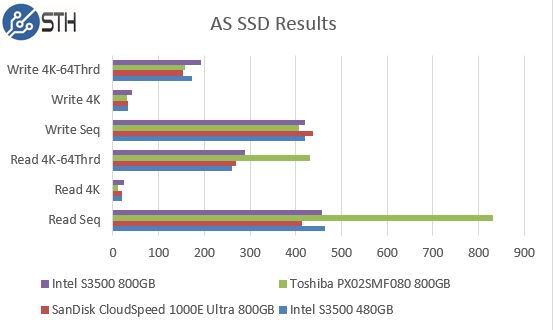
Our results are skewed a bit by the 12gbps SAS3 Toshiba PX02SMF080’s read speeds but overall the Intel S3500 800GB drive performs well compared to its 480GB counterpart and the SanDisk CloudSpeed offering.
CrystalDiskMark
CrystalDiskMark is another benchmark which gives non-compressible read/write numbers. This is in contrast to the ATTO Benchmark used by LSI/ Sandforce and its partners when they market a given solid state drive.

The QD32 results are the Intel S3500 800GB’s lowest relative rating points both for reads and writes. Still, we are using an absolute scale which does provide some perspective in terms of the magnitude of the drives. Frankly, our sample set is very close in performance except for the Toshiba drive’s read speeds.
ATTO Benchmark
The value of the ATTO benchmark is really to show the best-case scenario. ATTO is known to write highly compressible data to drives, which inflates speeds of controllers that compress data like LSI/ SandForce does prior to writing on a given solid state drive. First we will look at read speeds.
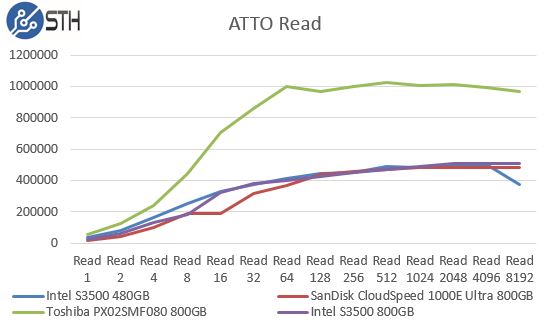
Here we can see the Toshiba PX02SMF080 is taking advantage of the 12gbps SAS 3 connection we are giving the drive. For read workloads, there is still an advantage to using higher speed drives if one needs to attain a higher throughput per HBA in a system.
In terms of the SATA drives, we can see that the Intel S3500 800GB drive performs similarly to the 480GB model and the SanDisk CloudSpeed 1000E Ultra 800GB drive.
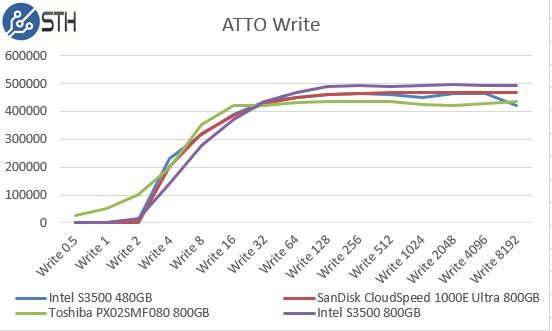
When it comes to write testing, we can see the Intel S3500 800GB falls below the Toshiba drive at lower block write sizes yet pulls ahead at larger block sizes. One can certainly see the tuning at work here. The SanDisk CloudSpeed 1000E Ultra 800GB drive does outpace the S3500 in the 4K to 32K range before falling off on larger sequential transfers.
Conclusion
Overall the Intel S3500 performs well compared to our comparison drives. The 450TBW figure is not a huge figure but there are a number of workloads where that figure will be fine. Specifically the read heavy workloads where the Intel S3500 800GB both has decent capacity but also solid performance.

